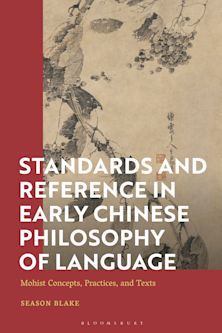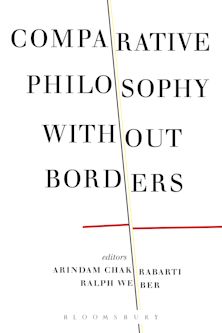- Home
- ACADEMIC
- Philosophy
- Chinese Philosophy
- Chinese and Buddhist Philosophy in Early Twentieth-Century German Thought
Chinese and Buddhist Philosophy in Early Twentieth-Century German Thought
Chinese and Buddhist Philosophy in Early Twentieth-Century German Thought
You must sign in to add this item to your wishlist. Please sign in or create an account
Description
Presenting a comprehensive portrayal of the reading of Chinese and Buddhist philosophy in early twentieth-century German thought, Chinese and Buddhist Philosophy in Early Twentieth-Century German Thought examines the implications of these readings for contemporary issues in comparative and intercultural philosophy.
Through a series of case studies from the late 19th-century and early 20th-century, Eric Nelson focuses on the reception and uses of Confucianism, Daoism, and Buddhism in German philosophy, covering figures as diverse as Buber, Heidegger, and Misch. He argues that the growing intertextuality between traditions cannot be appropriately interpreted through notions of exclusive identities, closed horizons, or unitary traditions. Providing an account of the context, motivations, and hermeneutical strategies of early twentieth-century European thinkers' interpretation of Asian philosophy, Nelson also throws new light on the question of the relation between Heidegger and Asian philosophy. Reflecting the growing interest in the possibility of intercultural and global philosophy, Chinese and Buddhist Philosophy in Early Twentieth-Century German Thought opens up the possibility of a more inclusive intercultural conception of philosophy.
Table of Contents
1. A Peculiar Journey: Confucian Philosophy in German Thought
2. The Problem of Life in China and Europe: Zhang Junmai, Eucken, and Driesch
3. Resentment and Ressentiment: Nietzsche, Scheler, and Confucian Ethics
4. Technology and the Way: Daoism in Buber and Heidegger
5. Heidegger, Misch, and the “Origins” of Philosophy
6. Phenomenology, Eurocentrism, and Asia: Husserl and Heidegger
7. Encounter, Dialogue, and Learning: Martin Buber and Zen Buddhism
8. Nothingness, Language, Emptiness: Heidegger and Chan Buddhism
Conclusion: Toward an Intercultural Philosophy
Bibliography
Index
Product details

| Published | 24 Aug 2017 |
|---|---|
| Format | Ebook (Epub & Mobi) |
| Edition | 1st |
| Extent | 288 |
| ISBN | 9781350002562 |
| Imprint | Bloomsbury Academic |
| Publisher | Bloomsbury Publishing |
About the contributors
Reviews
-
Nelson's Chinese and Buddhist Philosophy in Early Twentieth-Century German Thought is one of the most refined intercultural inquiry into modern and contemporary German philosophers' Eurocentric tendencies (from Hegel to Heidegger) as well as counter-tendencies (from Leibniz to Buber) that one can read today.
Journal of Chinese Philosophy
-
Books like this are always needful as we hopefully deconstruct and pluralize the grounds of philosophical activity. In these days of resurgent nationalism, global stupidity, ecological and economic crisis, and the ongoing siege against the humanities and philosophical discourse, this book feels especially needful and welcome … I would then offer the author nine bows of gratitude for this immensely valuable service on behalf of the rebirth of philosophy for all peoples, perhaps even all sentient beings, past, present, and future.
Dao: A Journal of Comparative Philosophy
-
Eric Nelson's book has the great merit of drawing our attention to the experiences of some great forerunners in intercultural philosophy in Weimar Germany from the end of World War I to the rise of National Socialism in 1933. Nelson's book is not merely a work on some historical episodes of intercultural philosophy but also a work showing the how of intercultural philosophy in itself … [A] very rich and detailed reconstruction of the intercultural openings undertaken by German philosophers.
Notre Dame Philosophical Reviews
-
Nelson shows great erudition in bringing together a wide variety of thinkers from both East and West, including importantly some lesser known, but very relevant thinkers from both the Western tradition and Eastern philosophy.
Global Intellectual History
-
This book offers lots of valuable information and entries for further research. It is well-written and has all the tools for easy reference and an impressive bibliography.
Phenomenological Reviews
-
A remarkably well-researched, thoughtful, and timely book. Its content lives up to its informative and wonderfully provocative title ... One of Nishitani's central claims is that nihilism can be overcome only by way of stepping back all the way through it ... we can thank Nelson for reintroducing us to this insight and for demonstrating how to heed it.
Research in Phenomenology

ONLINE RESOURCES
Bloomsbury Collections
This book is available on Bloomsbury Collections where your library has access.



































